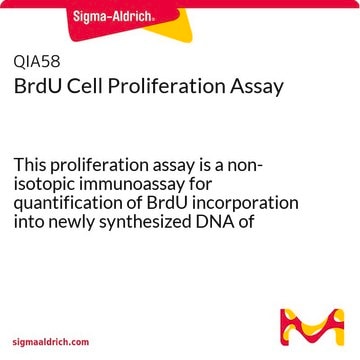11299964001
Roche
5-Bromo-2′-deoxy-uridine Labeling and Detection Kit II
sufficient for ≤100 tests, storage temp.:-20°C
Synonym(s):
5-BrdU, 5-Bromo-2-deoxyuridine
About This Item
Recommended Products
Related Categories
General description
Alternatively, 5-bromo-2′-deoxy-uridine (BrdU) may be used instead of thymidine. Cells that have incorporated BrdU into DNA are easily detected using a monoclonal antibody against BrdU and an enzyme- or fluorochrome-conjugated second antibody.
Specificity
application
- labeling of tooth roots for histology
- immunostaining of mice frontal sections
- immunofluorescence imaging of hepatocellular carcinoma sections
Features and Benefits
- Safe: No radioisotopes are used.
- Easy to perform: Follows a standard immunohistochemistry protocol.
- Sensitive: Denaturation of DNA with nucleases allows for highly sensitive detection of BrdU.
- Flexible: Allows double-labeling protocols.
Packaging
Principle
Preparation Note
Sample material:
Cell culture: adherent cells, suspension cells, organ or explant cultures. Frozen or paraffin-embedded tissue sections (after in vivo labeling).
Other Notes
Kit Components Only
- BrdU Labeling Reagent 1,000x concentrated
- Washing Buffer concentrate 10x concentrated
- Incubation Buffer
- Anti-BrdU antibody, contains nucleases for DNA denaturation
- Anti-mouse Ig-alkaline Phosphatase antibody
- NBT
- BCIP
signalword
Danger
Hazard Classifications
Acute Tox. 4 - Acute Tox. 4 Inhalation - Eye Irrit. 2 - Flam. Liq. 3 Dermal - Muta. 1B - Repr. 1B - Skin Sens. 1
Storage Class
3 - Flammable liquids
wgk_germany
WGK 2
flash_point_f
136.4 °F
flash_point_c
58 °C
Certificates of Analysis (COA)
Search for Certificates of Analysis (COA) by entering the products Lot/Batch Number. Lot and Batch Numbers can be found on a product’s label following the words ‘Lot’ or ‘Batch’.
Already Own This Product?
Find documentation for the products that you have recently purchased in the Document Library.
Customers Also Viewed
Articles
Cell based assays for cell proliferation (BrdU, MTT, WST1), cell viability and cytotoxicity experiments for applications in cancer, neuroscience and stem cell research.
Our team of scientists has experience in all areas of research including Life Science, Material Science, Chemical Synthesis, Chromatography, Analytical and many others.
Contact Technical Service













